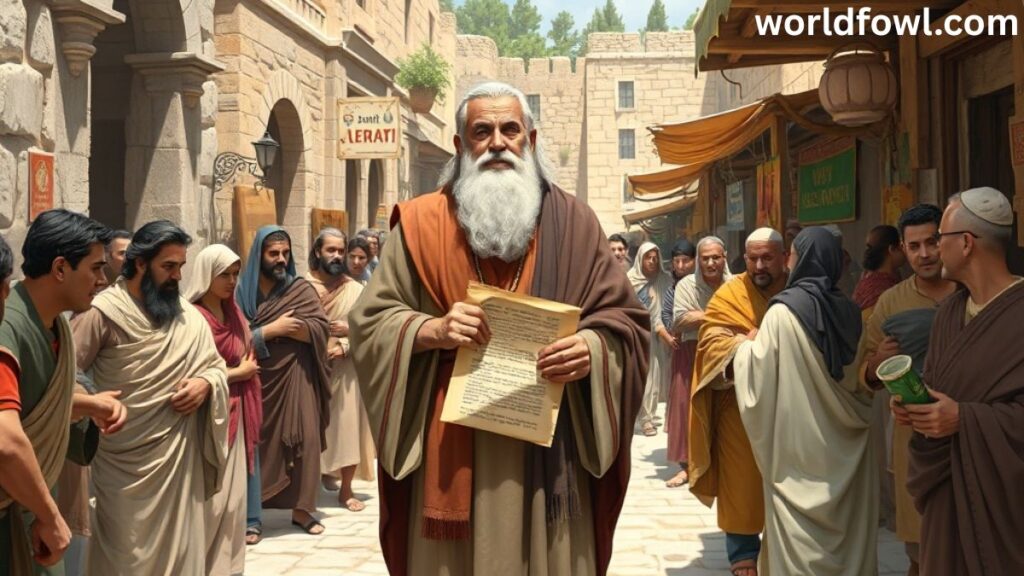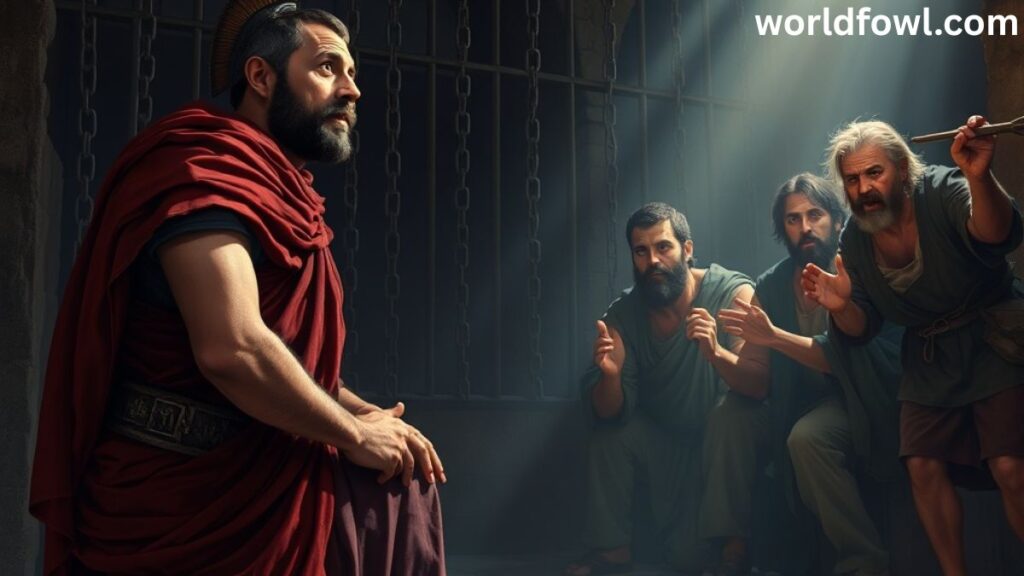“14 Interesting Facts About Silas in the Bible” refers to a collection of inspiring details about one of the most loyal and courageous figures in the early Christian church.14 Interesting Facts About Silas in the Bible Silas, also known as Silvanus, played a vital role alongside the Apostle Paul in spreading the gospel throughout the Roman world. His life reflects unwavering faith, dedication to Christ, and steadfast service during the formative years of Christianity.
14 Interesting Facts About Silas in the Bible Silas’s story is filled with moments of courage, endurance, and divine purpose. From standing firm during persecution to singing hymns in prison, his example continues to inspire believers today. 14 Interesting Facts About Silas in the Bible His remarkable journey from a church leader in Jerusalem to a missionary and co-author of New Testament letters reveals a man deeply rooted in faith and obedience.
These 14 interesting facts about Silas in the Bible uncover the legacy of a man whose influence shaped the growth of the early church and strengthened countless believers.
Silas Was a Leader in the Jerusalem Church
The Book of Acts introduces Silas as someone already respected within the Jerusalem community. This wasn’t a newcomer trying to prove himself. According to Acts 15:22, church leaders chose him alongside Judas Barsabbas to represent them in a critical mission. That selection speaks volumes about his standing.
Jerusalem served as Christianity’s epicenter during this period. The apostles who had walked with Jesus still led the community there. For Silas to gain recognition among these pillars of faith meant he’d demonstrated exceptional character and wisdom. The early church didn’t hand leadership positions to just anyone—especially not during times of controversy and rapid growth.
His role in church leadership went beyond administrative duties. Silas helped shape theological decisions that would define Christianity for generations. When debates erupted about whether Gentile believers needed to follow Jewish customs, his voice carried weight in those discussions. The Jerusalem Council trusted his judgment enough to make him their official representative.
This leadership foundation prepared Silas for everything that followed. His experience navigating complex theological disputes equipped him for the challenges he’d face on the mission field. You can’t fake the kind of respect he commanded—it came from years of faithful brother service in the trenches of early Christian movement.
He Was a Prophet
Acts 15:32 reveals something fascinating: “Judas and Silas, who themselves were prophets, said much to encourage and strengthen the believers.” This wasn’t just teaching or preaching. The prophetic gift represented a special manifestation of the Holy Spirit’s power in someone’s life.
Prophets in the first-century church served multiple functions. They received direct revelations from God. They spoke words of exhortation and warning. Most importantly, they strengthened believers through Spirit-led messages that addressed specific situations and needs.
Silas used his prophetic abilities to build up the church in Antioch. After delivering the letter from the Jerusalem Council, he didn’t simply hand over the document and leave. He stayed to encourage the congregation through his prophetic ministry. This pattern of combining practical service with spiritual gifts characterized his entire career.
The combination of prophecy and leadership made Silas uniquely valuable. He could discern God’s direction while also managing the practical realities of ministry. This dual capability explains why both Apostle Paul and Peter sought him out as a partner. They needed someone who could hear from heaven and handle earth’s challenges simultaneously.
Biblical leadership at its finest looks like this—spiritual encouragement flowing through someone who also possesses administrative competence and relational wisdom.
Silas Was Chosen to Deliver a Letter from the Jerusalem Council

The Jerusalem Council faced a make-or-break moment. Gentile believers were flooding into the church, and some insisted they needed circumcision and full observance of Mosaic law. This controversy threatened to split the movement before it really got started.
After intense debate, the apostles and elders crafted a letter outlining their decision. They needed messengers who could deliver this sensitive document with wisdom and authority. According to Acts 15:27, they chose Judas (called Barsabbas) and Silas, “who themselves will tell you the same things by word of mouth.”
This mission required more than just carrying mail. The delegates needed to explain the council’s reasoning, answer questions, and help the Antioch church understand the theological implications. Silas excelled at this assignment, demonstrating the communication skills that would serve him throughout his ministry career.
The letter freed Gentile believers from unnecessary burdens while maintaining essential moral standards. Acts 15:22 tells us Silas was among the “leaders among the believers” chosen for this task. His success in Syria and Cilicia proved he could handle high-stakes diplomatic missions.
This experience prepared Silas for his next major assignment. He’d learned how to navigate cultural differences, explain complex theology clearly, and represent leadership with integrity. These skills became invaluable when he partnered with Paul for extended missionary journeys.
He Became Paul’s Missionary Companion
After the Jerusalem Council mission, Silas returned to Jerusalem. He might have settled back into local church work, but God had other plans. When Paul and Barnabas had a sharp disagreement about taking John Mark on their next journey, a leadership crisis emerged (Acts 15:36-40).
Paul needed a new partner—someone mature, tested, and capable of enduring hardship. He chose Silas. Acts 15:40 records the moment: “Paul chose Silas and left, commended by the believers to the grace of the Lord.”
This partnership revolutionized early Christianity’s expansion. Unlike Barnabas, who was Paul’s peer, Silas seems to have functioned more as a loyal follower while still bringing his own gifts and authority. He had prophetic insight Paul valued. He carried credibility from Jerusalem that helped legitimize their message.
Their ministry partnership took them through Syria and Cilicia, strengthening churches and delivering the council’s decisions (Acts 15:41). They traveled on foot through dangerous territory, depending on local hospitality and facing constant uncertainty. Yet Silas never wavered.
What made their partnership work? Shared vision, complementary gifts, and mutual respect. Paul was the visionary apostle; Silas was the faithful servant who made those visions practical. Together, they formed one of the New Testament’s most effective ministry teams.
Silas Was Imprisoned with Paul in Philippi
Philippi represented Paul and Silas’s first major test as a team. After casting a demon out of a slave girl whose owners profited from her fortune-telling, the duo faced serious consequences. The owners dragged them before magistrates, who ordered them beaten and imprisoned (Acts 16:16-24).
The beating was brutal. Roman flogging could kill a person. Then guards threw them into the inner prison, fastening their feet in stocks. Most people would have questioned their calling at this point. Why would God allow such suffering if they were doing His work?
Acts 16:25 captures an astonishing scene: “About midnight Paul and Silas were praying and singing hymns to God, and the other prisoners were listening to them.” Bleeding, bruised, and shackled in darkness, they praised God. This wasn’t forced positivity—it reflected genuine faith under persecution.
Their worship and prayer triggered a supernatural response. Acts 16:26 describes an earthquake miracle that shook the prison’s foundations, opened every door, and loosened every chain. The Philippian jailer woke to chaos and nearly killed himself, assuming the prisoners had escaped.
This moment showcased Silas’s character. He could have fled during the confusion. Instead, he stayed with Paul, helping prevent the jailer’s suicide and seizing an opportunity for evangelism. Christian persecution couldn’t diminish their commitment to the Gospel.
He Witnessed the Conversion of the Philippian Jailer

The earthquake created an opening, but human compassion sealed the deal. When Paul called out, “Don’t harm yourself! We are all here!” the Philippian jailer recognized something supernatural was happening. His prisoners—beaten and chained hours earlier—had refused to escape.
Acts 16:29-30 shows his response: “The jailer called for lights, rushed in and fell trembling before Paul and Silas. He then brought them out and asked, ‘Sirs, what must I do to be saved?'”
Silas witnessed Paul’s famous reply firsthand: “Believe in the Lord Jesus, and you will be saved—you and your household” (Acts 16:31). Together, they explained the Gospel to the jailer and his family that very night. Before dawn broke, the entire household had been baptized.
This conversion story illustrates the power of authentic faith. The jailer didn’t respond to eloquent preaching in a cathedral. He responded to two men who sang hymns in prison and showed more concern for his life than their own freedom. Silas’s consistent witness in suffering proved as powerful as any sermon.
The jailer washed their wounds and fed them. The persecutor became the caretaker. The prisoner became the honored guest. This pattern repeated throughout Paul and Silas’s travels—suffering led to breakthrough, and apparent defeat became salvation for others.
Silas Traveled to Thessalonica and Berea
After their release from Philippi, Paul and Silas continued to Thessalonica, Macedonia’s capital city. They spent about three weeks there, reasoning from the Scriptures in the synagogue (Acts 17:1-2). Acts 17:4 tells us, “Some of the Jews were persuaded and joined Paul and Silas, as did a large number of God-fearing Greeks and quite a few prominent women.”
Thessalonica represented a strategic win. It was a major commercial hub on the Via Egnatia, Rome’s main highway through Macedonia. A thriving church there could influence the entire region. Yet success bred opposition. Jealous religious leaders formed a mob and started a riot (Acts 17:5-7).
The believers sent Paul and Silas away by night to Berea. This pattern of persecution and relocation marked their entire journey. Rather than discourage them, opposition seemed to energize their mission. Each setback opened new doors.
Berea offered a refreshing change. Acts 17:11 describes the Bereans as “of more noble character than those in Thessalonica, for they received the message with great eagerness and examined the Scriptures every day to see if what Paul said was true.” Silas must have appreciated working with people who tested claims against Scripture rather than rejecting them outright.
Many Bereans believed, including “a number of prominent Greek women and many Greek men” (Acts 17:12). However, opposition from Thessalonica soon reached Berea, forcing another strategic retreat. Paul left for Corinth, while Silas and Timothy stayed behind to strengthen the new believers.
He Later Rejoined Paul in Corinth
Silas and Timothy’s work in Macedonia continued after Paul departed. They strengthened believers in both Thessalonica and Berea, ensuring these young churches had solid foundations before moving on. This required patience and pastoral skill—qualities Silas possessed in abundance.
Meanwhile, Paul reached Corinth and began preaching there. Acts 18:5 marks a turning point: “When Silas and Timothy came from Macedonia, Paul devoted himself exclusively to preaching, testifying to the Jews that Jesus was the Messiah.”
Their reunion in Corinth reinvigorated Paul’s ministry. Timothy brought news from the churches, including challenges the Thessalonians faced. This report prompted Paul to write his first letter to that congregation—with Silas and Timothy listed as co-authors.
Corinth presented unique ministry challenges. As a notorious port city famous for immorality, it required a different approach than rural Berea or commercial Thessalonica. Silas’s experience and prophetic gifting helped Paul navigate these cultural complexities.
The team stayed in Corinth for eighteen months (Acts 18:11), establishing one of the early church’s most important communities. This extended residency allowed them to build deep relationships and address thorny theological questions. Silas’s contribution during this period, though less documented, was crucial to the church’s success.
Silas Co-Wrote Letters in the New Testament
1 Thessalonians 1:1 opens with this greeting: “Paul, Silas and Timothy, To the church of the Thessalonians in God the Father and the Lord Jesus Christ: Grace and peace to you.” This wasn’t merely adding names for courtesy. Silas genuinely co-authored this letter.
The Epistles of Paul that include Silas as a co-author reflect collaborative ministry at its finest. While Paul likely dictated the content, Silas’s prophetic insight and pastoral wisdom shaped the message. He’d witnessed the church’s birth in Thessalonica and understood their struggles intimately.
2 Thessalonians also lists Paul, Silas and Timothy as authors. These letters addressed critical issues: faith under persecution, questions about Christ’s return, and practical matters of church discipline. Silas’s prophetic gifting helped them speak with authority about future events.
His involvement in New Testament writings extends Silas’s influence across centuries. Millions have read his words without fully recognizing his contribution. Every time someone quotes 1 Thessalonians, they’re quoting Silas as much as Paul.
This literary legacy demonstrates Silas’s theological sophistication. You don’t co-author Scripture unless you understand doctrine deeply and can articulate faith clearly. His education, combined with his Spirit-led prophetic ministry, made him an ideal writing partner for Paul’s ambitious theological projects.
Peter Also Trusted Silas

The New Testament contains one more significant reference to Silas—this time from Peter the Apostle. 1 Peter 5:12 states: “With the help of Silas, whom I regard as a faithful brother, I have written to you briefly, encouraging you and testifying that this is the true grace of God. Stand fast in it.”
This verse reveals several important facts. First, Silas (called Silvanus here) served as Peter’s scribe or secretary. Second, Peter considered him a reliable messenger and trusted brother. Third, Silas continued his ministry long after his travels with Paul ended.
Peter’s endorsement carries immense weight. As Jesus’s closest disciple and the leader of the Jerusalem church, Peter knew everyone in the early Christian movement. When he calls someone a faithful brother, it means something. He’d observed Silas’s character over many years and found him consistently trustworthy.
The phrase “written to you briefly” suggests Silas played a significant role in composing 1 Peter. Some scholars believe he served as more than a mere transcriber—he may have helped shape the letter’s content and structure. His experience writing with Paul prepared him perfectly for this assignment.
This connection to both Paul and Peter makes Silas one of the few figures who bridged the early church’s two main leadership streams. He worked effectively with both the apostle to the Gentiles and the apostle to the Jews. That versatility reflects remarkable relational skills and theological breadth.
Silas Embodied Persevering Faith
Throughout his documented ministry, Silas demonstrated what persevering in faith actually looks like. He didn’t just endure hardship—he found joy in it. That midnight worship session in the Philippi prison wasn’t an isolated incident. It represented his consistent attitude toward suffering.
Christian persecution during the first century was no joke. Believers faced beatings, imprisonment, exile, and death. Yet Silas never appears to have second-guessed his calling. He understood that advancing the Gospel required sacrifice.
His perseverance wasn’t passive resignation. He actively pursued ministry opportunities despite knowing the risks. Paul needed a companion after the split with Barnabas, Silas didn’t hesitate. When churches needed strengthening, he stayed behind while Paul moved ahead. When imprisoned, he sang hymns instead of cursing his fate.
This kind of faithful servant leadership shaped the early church’s DNA. New believers watched Silas and Paul respond to persecution with worship, and they learned to do likewise. His example taught them that faith isn’t about avoiding problems—it’s about maintaining trust in God’s goodness regardless of circumstances.
Obedient disciple doesn’t fully capture what Silas modeled. He showed devoted missionary commitment that transcended personal comfort. His life asked a question every believer must answer: “What am I willing to sacrifice for the Gospel?”
Silas Exemplified Selfless Partnership
One of Silas’s most admirable qualities was his ability to work alongside stronger personalities without competing or withdrawing. Paul was brilliant, visionary, and occasionally difficult. Yet Silas partnered with him effectively for years.
Ministry partnership often fails because of ego clashes. Someone needs to be in charge. Someone else resents taking second place. Silas apparently lacked this insecurity. He brought significant gifts and credentials to the table—prophet, leader, trusted messenger—but he never seems to have jockeyed for position.
This selflessness made him valuable to multiple leaders. Paul trusted him completely. Peter regarded him as a faithful brother. The Jerusalem church sent him as their official representative. All these relationships required humility and secure identity.
Apostolic teamwork in the first century depended on people like Silas who could lead without needing the spotlight. The spread of Christianity happened because dozens of devoted missionaries did unglamorous work in difficult places. They wrote letters, delivered messages, strengthened new believers, and endured persecution—often without recognition.
Silas teaches us that effective ministry isn’t always about being the primary speaker or receiving credit. Sometimes the most crucial role is being the reliable messenger who ensures the message gets through. The loyal follower who makes the leader more effective often accomplishes more than ten average leaders working alone.
Silas Demonstrated the Power of Worship in Darkness

That scene in Philippi’s prison deserves deeper reflection. Paul and Silas weren’t gently humming choruses. Acts 16:25 says they were “singing hymns to God, and the other prisoners were listening.” This was full-voiced, intentional worship.
They’d been stripped, severely flogged, and thrown into the inner prison with their feet in stocks. Their backs were raw. Every movement caused pain. Sleep was impossible. Yet they chose worship over complaint, praise over self-pity.
This decision reflected deep theological conviction. They believed God was good even when circumstances screamed otherwise. They trusted His purposes even when those purposes included suffering. Their faith wasn’t contingent on comfort—it was anchored in God’s character regardless of their situation.
The earthquake miracle that followed suggests God responds to this kind of worship. Not that He’s manipulated by our praise, but that authentic worship in suffering demonstrates faith that moves heaven. The Philippian jailer’s conversion resulted directly from witnessing this supernatural faith under persecution.
Silas’s willingness to sing hymns in prison reveals the source of his endurance. He’d learned to find God’s presence in the darkness. This spiritual discipline sustained him through years of itinerant ministry, constant opposition, and repeated hardship.
Silas Left a Legacy of Faithful Service
Unlike Paul or Peter, Silas didn’t leave behind a dramatic conversion story or multiple autobiographical letters. We don’t know his background before appearing in Acts 15. We’re uncertain about his death. Yet his influence on Christianity is undeniable.
co-authored New Testament books read by billions. helped establish churches across the Roman Empire.trained younger leaders like Timothy. He bridged different factions within the early church. He demonstrated that ordinary believers empowered by the Holy Spirit can accomplish extraordinary things.
The early church leadership model Silas embodied differs sharply from modern celebrity Christianity. focused on faithful brother service rather than building personal platforms. He invested in relationships rather than accumulating followers. He pursued kingdom impact rather than individual recognition.
Church growth in the first century depended heavily on people like Silas who did the hard work of establishing and strengthening communities. They lived with new believers, taught them Scripture, modeled faith, and addressed problems as they arose. This patient, personal approach created deep roots that allowed Christianity to survive persecution and spread despite opposition.
Today’s church needs more leaders with Silas-like qualities. need prophets who combine spiritual gifts with practical wisdom. need missionaries who persevere through hardship. We need partners who value collaboration over competition. We need servants content to work without constant recognition.
What Modern Believers Can Learn from Silas
Silas’s life offers multiple lessons for contemporary Christians. First, faithful service in obscurity matters. You don’t need a massive platform to make a kingdom impact. Quiet consistency often accomplishes more than flashy visibility.
Second, genuine partnership in ministry multiplies effectiveness. Silas succeeded because he worked well with others. could lead and follow. He could speak and listen. He valued team success over personal glory.
Third, suffering doesn’t disqualify you from worship. The Philippi prison experience teaches that our response to hardship reveals our theology. Do we believe God is good only when life goes well? Or do we trust Him regardless of circumstances?
Fourth, persevering in faith requires daily choices. Silas didn’t suddenly become strong during his imprisonment. He developed spiritual disciplines over time that sustained him during crisis. His midnight worship flowed from years of consistent prayer and dependence on God.
Fifth, effective ministry often happens behind the scenes. Silas’s work strengthening churches in Berea and Thessalonica receives minimal biblical attention, yet it was crucial. Not every important contribution makes headlines.
Finally, faithful brother relationships sustain long-term ministry. Silas maintained connections with Paul, Peter, Timothy, and the Jerusalem leadership. These relationships provided support, accountability, and opportunities for collaboration.
Silas remains one of the New Testament’s most underappreciated figures. While Paul gets books and Peter gets recognition, Silas quietly influenced Christianity in profound ways. He was a leader, prophet, missionary, co-author, and faithful brother whose courageous believer example shaped the early church.
The His partnership with Paul advanced the Gospel across the Roman Empire.prophetic ministry strengthened believers in multiple cities. His writing contributions gave us Scripture we still read today. His relationship with Peter bridged different streams within the apostolic ministry.
Most importantly, Silas showed that devoted missionary service doesn’t require constant recognition. He was content being the reliable messenger, the trusted brother, the Spirit-led leader who helped others succeed. His life challenges our culture’s obsession with visibility and personal branding.
The spread of early Christianity happened because of people like Silas—faithful servants who counted Gospel advancement more valuable than personal comfort. They traveled dangerous roads, endured persecution, established churches, and wrote letters without seeking glory. Their persevering faith created the foundation we build on today.
you read 1 Thessalonians or study the conversion of the Philippian jailer, remember Silas. When you appreciate churches that persevered through persecution, think of the encouraging prophet who strengthened them. When you consider what effective ministry partnership looks like, study how Silas worked alongside others.
His legacy reminds us that faithful service matters more than famous names. The faithful brother who serves consistently in obscurity often accomplishes more eternal good than the celebrity who attracts crowds but lacks depth. Silas embodied this truth—and his example still speaks powerfully to believers seeking to make a lasting kingdom impact.
Conclusion
These 14 interesting facts about Silas in the Bible reveal a man whose impact far exceeded his fame. He wasn’t seeking spotlight or recognition. Instead, Silas devoted himself to faithful service alongside the early church’s greatest leaders.14 Interesting Facts About Silas in the Bible His willingness to endure beatings, imprisonment, and constant travel demonstrated genuine commitment to spreading the Gospel.14 Interesting Facts About Silas in the Bible Every fact we’ve explored shows a pattern—Silas chose obedience over comfort, partnership over competition, and worship over complaint.
When you study these 14 interesting facts about Silas in the Bible, you discover what authentic Christian leadership looks like. He served as prophet, missionary, writer, and encourager without demanding credit. His midnight worship in prison still inspires believers today. His partnerships with Paul and Peter shaped Christianity’s foundation. 14 Interesting Facts About Silas in the Bible Silas proves that you don’t need a famous name to make eternal impact. You just need faithful service, courageous faith, and willingness to go wherever God calls.








